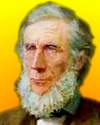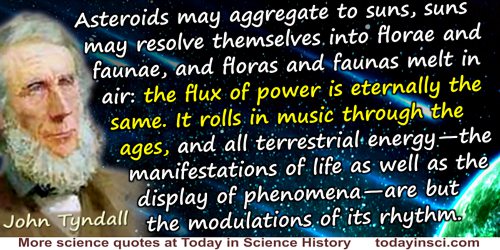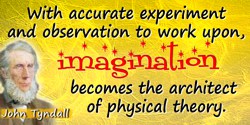 (source)
(source)
|
John Tyndall
(2 Aug 1820 - 4 Dec 1893)
Irish physicist who demonstrated why the sky is blue. He wrote on diverse topics, including crystals, glaciers and radiation. His studies also included spontaneous generation, the germ theory of disease and ozone.
|
John Tyndall Quotes on Life (10 quotes)
>> Click for 48 Science Quotes by John Tyndall
>> Click for John Tyndall Quotes on | Experiment | Fact | Faraday_Michael | Michael Faraday | Nature | Number | Observation | Phenomenon | Power | Science | Truth | Wave |
>> Click for 48 Science Quotes by John Tyndall
>> Click for John Tyndall Quotes on | Experiment | Fact | Faraday_Michael | Michael Faraday | Nature | Number | Observation | Phenomenon | Power | Science | Truth | Wave |
A few days ago, a Master of Arts, who is still a young man, and therefore the recipient of a modern education, stated to me that until he had reached the age of twenty he had never been taught anything whatever regarding natural phenomena, or natural law. Twelve years of his life previously had been spent exclusively amongst the ancients. The case, I regret to say, is typical. Now we cannot, without prejudice to humanity, separate the present from the past.
— John Tyndall
'On the Study of Physics', From a Lecture delivered in the Royal Institution of Great Britain in the Spring of 1854. Fragments of Science for Unscientific People: A Series of Detached Essays, Lectures, and Reviews (1892), Vol. 1, 284-5.
Believing, as I do, in the continuity of nature, I cannot stop abruptly where our microscopes cease to be of use. Here the vision of the mind authoritatively supplements the vision of the eye. By a necessity engendered and justified by science I cross the boundary of the experimental evidence, and discern in that Matter which we, in our ignorance of its latent powers, and notwithstanding our professed reverence for its Creator, have hitherto covered with opprobrium, the promise and potency of all terrestrial Life.
— John Tyndall
'Address Delivered Before The British Association Assembled at Belfast', (19 Aug 1874). Fragments of Science for Unscientific People: A Series of Detached Essays, Lectures, and Reviews (1892), Vol. 2, 191.
Does life belong to what we know as matter, or is it an independent principle inserted into matter at some suitable epoch when the physical conditions became such as to permit the development of life?
— John Tyndall
In Fragments of Science for Unscientific People: A Series of Detached Essays (1871), 158.
Life is a wave, which in no two consecutive moments of its existence is composed of the same particles.
— John Tyndall
In 'Vitality', Scientific Use of the Imagination and Other Essays (1872), 62.
The conclusion of Science which recognizes unbroken casual connection between the past and the present would undoubtedly be that the molten earth contained within it elements of life, which grouped themselves into their present forms as the planet cooled. … The difficulty and reluctance encountered by this conception, arise solely from the fact that the theologic conception obtained a prior footing in the human mind. Did the latter depend upon reasoning alone, it could not hold its ground for an hour against its rival. * * * Were not man’s origin implicated, we should accept without a murmur the derivation of animal and vegetable life from what we call inorganic nature. The conclusion of pure intellect points this way and no other.
— John Tyndall
As quoted in 'The Origin of Life', Scientific American (25 Dec 1875), 33, No. 26, 400. The article (by an unnamed writer), having quoted Tyndall, includes a parenthetical clarification, “The context shows that by ‘elements of life,’ Professor Tyndall does not mean entities but possibilities of molecular condition by which the phenomena of life were to be evolved in the natural course of events, not by the miraculous addition of a new force but by means of the forces already in play.”
The law of conservation rigidly excludes both creation and annihilation. Waves may change to ripples, and ripples to waves,—magnitude may be substituted for number, and number for magnitude,—asteroids may aggregate to suns, suns may resolve themselves into florae and faunae, and florae and faunae melt in air,—the flux of power is eternally the same. It rolls in music through the ages, and all terrestrial energy,—the manifestations of life, as well as the display of phenomena, are but the modulations of its rhythm.
— John Tyndall
Conclusion to lecture 12 (10 Apr 1862) at the Royal Institution, collected in Heat Considered as a Mode of Motion: Being a Course of Twelve Lectures (1863), 449.
The mutton in the study gathered over it a thick blanket of Penicillium. On the 13th [December 1875] it had assumed a light brown colour as if by a faint admixture of clay; but the infusion became transparent. The ‘clay’ here was the slime of dead or dormant Bacteria, the cause of their quiescence being the blanket of Penicillium. I found no active life in this tube, while all the others swarmed with Bacteria. In every case where the mould was thick and coherent the Bacteria died, or became dormant, and fell to the bottom of the sediment … The Bacteria which manufacture a green pigment appear to be uniformly victorious in their fight with the Penicillium.
— John Tyndall
From paper read to the Royal Institution (1 Jan 1876). In 'Professor Tyndall on the Optical Deportment of the Atmosphere in Relation to Putrefaction and Infection' , Philosophical Transactions of the Royal Society of London (1876), 166, 62.
To Nature nothing can be added; from Nature nothing can be taken away; the sum of her energies is constant, and the utmost man can do in the pursuit of physical truth, or in the applications of physical knowledge, is to shift the constituents of the never-varying total. The law of conservation rigidly excludes both creation and annihilation. Waves may change to ripples, and ripples to waves; magnitude may be substituted for number, and number for magnitude; asteroids may aggregate to suns, suns may resolve themselves into florae and faunae, and floras and faunas melt in air: the flux of power is eternally the same. It rolls in music through the ages, and all terrestrial energy—the manifestations of life as well as the display of phenomena—are but the modulations of its rhythm.
— John Tyndall
Conclusion of Heat Considered as a Mode of Motion: Being a Course of Twelve Lectures Delivered at the Royal Institution of Great Britain in the Season of 1862 (1863), 449.
Underneath his sweetness and gentleness was the heat of a volcano. [Michael Faraday] was a man of excitable and fiery nature; but through high self-discipline he had converted the fire into a central glow and motive power of life, instead of permitting it to waste itself in useless passion.
— John Tyndall
In Faraday as a Discoverer (1868), 37.
Without the suitable conditions life could not exist. But both life and its conditions set forth the operations of inscrutable Power. We know not its origin; we know not its end. And the presumption, if not the degradation, rests with those who place upon the throne of the universe a magnified image of themselves, and make its doings a mere colossal imitation of their own.
— John Tyndall
In Forms of Water in Clouds and Rivers, Ice and Glaciers (1872), 125.
See also:
- 2 Aug - short biography, births, deaths and events on date of Tyndall's birth.
- John Tyndall - context of quote “Fatal…to blink facts” - Medium image (500 x 250 px)
- John Tyndall - context of quote “Fatal…to blink facts” - Large image (800 x 400 px)
- John Tyndall - context of quote “The First Experiment a Child Makes” - Medium image (500 x 250 px)
- John Tyndall - context of quote “The First Experiment a Child Makes” - Large image (800 x 400 px)
- On Matter and Force - John Tyndall’s Lecture to general public at Dublin (1867).
- A Vision of Modern Science: John Tyndall and the Role of the Scientist in Victorian Culture, by Ursula DeYoung. - book suggestion.




 In science it often happens that scientists say, 'You know that's a really good argument; my position is mistaken,' and then they would actually change their minds and you never hear that old view from them again. They really do it. It doesn't happen as often as it should, because scientists are human and change is sometimes painful. But it happens every day. I cannot recall the last time something like that happened in politics or religion.
(1987) --
In science it often happens that scientists say, 'You know that's a really good argument; my position is mistaken,' and then they would actually change their minds and you never hear that old view from them again. They really do it. It doesn't happen as often as it should, because scientists are human and change is sometimes painful. But it happens every day. I cannot recall the last time something like that happened in politics or religion.
(1987) -- 


